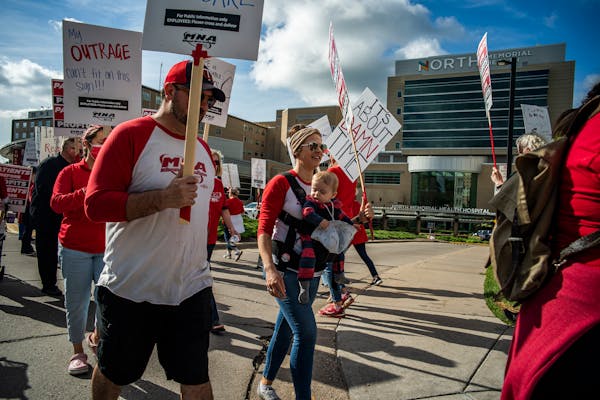A long string of IV pumps sat unused but ready Friday in an Allina Health training facility in Minneapolis, where thousands of temporary nurses from across the country will receive rapid orientation this weekend.
Leaders of the Minneapolis-based health system said they hope the effort will go to waste — that they reach overdue contracts with their regular nurses. But they have to be prepared to maintain patient care at their hospitals when a planned three-day strike starts at 7 a.m. Monday.
"We feel pretty confident we're going to be able to be there for our patients and our community and to provide really safe and reliable care," said Jill Ostrem, Allina's president of Mercy Hospital in Coon Rapids and United Hospital in St. Paul.
As many as 15,000 nurses are planning to strike at 16 hospitals in the Twin Cities and Duluth area, including four Allina hospitals. Top issues include safety amid increasingly agitated patients and the retention of nurses who are often quitting amid the stress of the pandemic, leaving hospitals short-staffed. A key divide is over pay raises for the next three years.
Negotiations took place Friday between the nurses, represented by the Minnesota Nurses Association, and the leaders of the Allina, Children's and Fairview hospital systems and of Methodist Hospital in St. Louis Park and North Memorial in Robbinsdale. By day's end, the nurses at most bargaining tables still wanted pay raises of almost 30% after three years while the hospitals offered a little more than 10%.
Union Vice President Chris Rubesch, a nurse at an Essentia Health hospital in Duluth, said a pay raise is just one in a series of changes that are needed to address a retention problem that has been neglected for years.
"It's frustrating, and that's why we're in this position," he said. "We cannot go another three years without addressing this crisis."
Talks were scheduled for the Duluth hospitals and some of the Twin Cities hospitals Saturday, but the mood among negotiators was that a strike looks likely. Hospital leaders argued they can't meet the nurses' wage demands at a time when many nonprofit systems are reporting multimillion-dollar losses.
Hospitals executed contracts with national temp staffing agencies this week and reported a response rate among replacement nurses that should allow them to maintain usual operations.
Children's Minnesota delayed elective inpatient surgeries until after the strike, but others planned for usual schedules and only a handful of canceled procedures.
No changes in operations were planned at Methodist when replacement nurses take over, said its parent organization, HealthPartners. The health system has a contingency plan to increase emergency trauma staffing if needed next week at Regions Hospital in St. Paul, which is not involved in the strike.
Of the three major adult trauma centers in the Twin Cities, only North Memorial is involved in the strike.
Allina would be prepared to absorb the cost of hiring and training replacement nurses if an agreement is reached this weekend and its regular nurses report for work Monday, said David Joos, president of Allina's flagship Abbott Northwestern Hospital in Minneapolis.
Otherwise, he expressed confidence in the competency of the incoming nurses and urged people to seek care from their usual health care providers or facilities.
"These are very seasoned nurses. We're not in 48 hours teaching them how to be a seasoned, high-quality-care nurse," he said. "What we are doing is orienting them to our environment."
Training issues include familiarizing nurses with the specific models of equipment used at Allina, including IV pumps and pharmacy dispensing machines.
The replacements are hired for 12-hour shifts per day over five days, giving the hospitals two days after the strike to continue to use them and gradually rotate the regular nurses back to work.
Some regular nurses would return later in the week for their scheduled shifts while others would come back right away as need dictates, Ostrem said.
"We will be bringing back our nurses as the work demands, as we need to fill holes," she said.

Want to share info with the Star Tribune? How to do it securely

'Safe recovery sites' would offer syringes, naloxone and more to people using drugs. The plan could be in peril.
New Minnesota GOP leaders seek peace with party's anti-establishment wing

Who is Republican Lisa Demuth, Minnesota's first House speaker of color?

